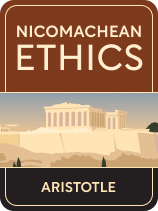

This article is an excerpt from the Shortform book guide to "Nicomachean Ethics" by Aristotle. Shortform has the world's best summaries and analyses of books you should be reading.
Like this article? Sign up for a free trial here .
What is moral virtue? Is it simply being good, or is there more to it than that?
In his Nicomachean Ethics, Aristotle concludes that happiness comes from consistently making the right choices over the course of a lifetime (rational activity aligned with virtue). Not only must the actions be right, but the motives behind them must also be right.
Keep reading to understand how, in Aristotle’s view, virtuous actions and virtuous reasons add up to moral virtue.
Defining Moral Virtue
Aristotle claims that people are morally virtuous when they habitually do virtuous actions for virtuous reasons. Both of these components are essential to virtue. Here’s how Aristotle answers the question, “What is moral virtue?”
Virtuous Actions
Moral virtue is the result of habitual virtuous action. People aren’t born naturally virtuous, so it’s something they have to learn—and people learn through repeated action. It makes no sense to call someone virtuous if they don’t consistently do virtuous things, just as it makes no sense to call someone a great chef just because they occasionally make toast. In addition, Aristotle argues that there aren’t simple, universal rules someone can follow to be virtuous. Instead, a virtuous person must determine what is appropriate for each individual situation and then do it.
For example, Frank is morally virtuous. Growing up, his parents taught him to help those who can’t help themselves—a tenet that Frank has always lived by. One day, Frank sees a child who’s trapped at the bottom of a well. He immediately grabs a nearby rope and helps the child up, then gets the child home. Frank isn’t morally virtuous just because he saved the child, though (a single virtuous act)—he’s morally virtuous because he always helps those in need (he habitually acts virtuously).
(Shortform note: A common criticism of Aristotle’s moral philosophy (and other philosophies like it) is that it doesn’t help people decide what to do. Instead, critics argue that Aristotle only explains what people should be (courageous, patient, and so on). In a real-life situation involving an ethical decision, this becomes a problem. While “Treat others how you want to be treated” can help you make a decision, “Be virtuous” will not. Defenders of Aristotle claim that there’s not much of a difference between a rule that says what to do and a rule that says what to be—for example, Aristotle saying, “Be honest” easily translates to, “Do not lie.” From this perspective, Aristotle does offer guidelines for action—vague ones, maybe, but guidelines nonetheless.)
Virtuous Reasons
For a person to be virtuous, they have to do virtuous actions for the right reasons. People learn to be virtuous through habit—and they won’t learn or create habits from accidentally or unintentionally doing virtuous things. Therefore, virtuous acts are intentional, voluntary, and done for virtue itself rather than some other benefit.
For example, morally virtuous Frank helps an old woman cross the street because it’s the right thing to do—not because she’ll give him money for it, or because it’ll make him look good in front of his friends.
(Shortform note: Some critics argue that Aristotle defines virtuous people with circular logic. They point out two of his claims: 1) An action is virtuous if it’s what a virtuous person would do, and 2) a person is virtuous when they act in virtuous ways. This tells us nothing about virtue: To understand virtuous actions, we need to understand a virtuous person. To understand a virtuous person, we need to understand virtuous actions. However, others argue that this criticism misinterprets Aristotle. They say he actually makes these two claims: 1) Virtuous people know how to do virtuous actions for virtuous reasons, and 2) a person is virtuous if they do virtuous actions for virtuous reasons. These claims don’t rely on each other and therefore don’t use circular logic.)

———End of Preview———
Like what you just read? Read the rest of the world's best book summary and analysis of Aristotle's "Nicomachean Ethics" at Shortform .
Here's what you'll find in our full Nicomachean Ethics summary :
- Aristotle's philosophies on topics such as happiness, virtue, and wisdom
- What it means to be morally virtuous and how someone can develop moral virtue
- How wisdom contributes to the possibility of a happy life






